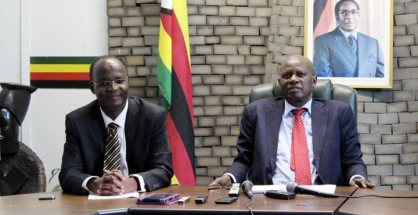


 STATE enterprises, parastatals and local authorities were paying out an untaxed total amount of US$85 million since dollarisation to their top executives numbering 181, a move which was largely designed for tax evasion purposes. Computations by tax experts show that heads of Zimbabwe’s 90 mostly insolvent parastatals and 91 bankrupt local authorities have been diverting a combined US$21 million in annual incomes to untaxed benefits to dodge the taxman.
STATE enterprises, parastatals and local authorities were paying out an untaxed total amount of US$85 million since dollarisation to their top executives numbering 181, a move which was largely designed for tax evasion purposes. Computations by tax experts show that heads of Zimbabwe’s 90 mostly insolvent parastatals and 91 bankrupt local authorities have been diverting a combined US$21 million in annual incomes to untaxed benefits to dodge the taxman.
With the anomaly dating back to when dollarisation was adopted, this translates to more than US$85 million from 2009 to end of 2013. The practice has continued to date, further draining public funds. The Cabinet Committee on State Enterprises and Parastatals Development said government had observed that its chief executive officers (CEOs) were taking advantage of loopholes in the law to divert the bulk of their incomes to benefits, which were not being taxed, with only a smaller percentage being paid out as salaries, which are taxable.
Schedules released by Finance Minister, Patrick Chinamasa, who is the chairman of the Cabinet Committee showed that local authorities’ bosses were earning a combined US$521 301 per month in untaxed “Guaranteed Benefits” per month and an additional US$312 741 in untaxed “Benefit Value” allowances, which Treasury claimed were not being subjected to tax. This translates to about US$834 042 per month, or US$10 million per annum by local authorities alone. While for parastatals, despite running the entities down, the top executives were taking home a combined US$939 544 in monthly benefits.
Tax expert and CEO at Stallone Consultancy, Zack Murerwa, said over US$20 million per year could have accrued to the State from public firms and local authorities since dollarisation in 2009. This means as much as US$85 million could have been paid to State CEOs as benefits without being taxed until last year. He said the majority of the CEOs and heads of local authorities fell into the 35 percent tax bracket.
“According to Section 8 of the Income Tax Act, any benefit that accrues to a manager is taxable,” he told the Financial Gazette. “But most companies have not been taxing staff correctly and the Zimbabwe Revenue Authority (ZIMRA) has seen this. They have moved in to make corrections. There is no doubt in my mind that some of the listed benefits were running through secret payrolls.
If there was to be a comprehensive audit by ZIMRA on the companies concerned, you will see that there is prejudice to the State,” said Murerwa, the author of several Zimbabwean tax handbooks. “There are questionable tax commitments from the listed firms, especially on benefits,” he added. Chinamasa said the full extent of the prejudice to the tax system was currently being verified through extensive State audits.
“We will only be able to tell how much in term of taxes was not paid after completing the audits,” Chinamasa said. The minister hinted at heavy punishment against looters who would be found to have irregularly pampered themselves with ill-gotten wealth to oil expensive lifestyles. According to Murerwa, penalties for tax evasion are pegged at 130 percent of the outstanding amount. However, a labour and tax law expert who spoke on condition of anonymity, said it was important to determine for sure if what was taking place was tax evasion or tax avoidance. “Tax avoidance is legal, but tax evasion is illegal,” he told the Financial Gazette.
On the decision by government to unilaterally slash salaries, the expert said; “Once a contract is validly entered into, it takes the consent of the other part to vary the contract. But there are some decisions that have been made by the courts that allow the employer to vary a contract in the commercial interest of the business. However, if they increased benefits illegally, it becomes abuse of public office and the employer will be right to restore normalcy”.
The Cabinet committee, which has stipulated that CEOs of these entities receive a total basic salary and benefits package of US$6 000 per month for those on job level 1 (the highest), has also directed that of that amount, the basic pay to benefits ratio be 60 percent: 40 percent. According to existing schedules, NetOne managing director, Reward Kangai earned one of the highest untaxed percentage with 77 percent of his US$43 693 total pay coming through as benefits.
Gloria Magombo, CEO of the Zimbabwe Energy Regulatory Authority had 61 percent of her US$28 403 earnings coming as benefits; while former Public Service Medical Aid Society CEO Cuthbert Dube earned 57 percent of his US$535 499 monthly income through benefits, and the Zimbabwe Broadcasting Corporation’s Happison Muchechetere received 60 percent of his earnings as benefits. Others who had very high percentages of the benefits include heads of Agricultural and Rural Development Authority at 89 percent; National Handling Services at 88 percent, Zimbabwe Parks and Wildlife Management Authority at 82 and Zimstats at 74.
The same scenario played out in local authorities with the highest percentage of 93 percent by Plumtree Town Council. The manipulation of public funds that has haemorrhaged loss making parastatals and driven municipalities and rural district councils to the brink of collapse, has been ongoing since dollarisation in 2009, according to Information Minister, Jonathan Moyo, who attended a press conference to reveal the incomes.
Chinamasa admitted that government had ignored the rot in parastatals while politicians were fighting for control during the era of the inclusive government, which ended in 2013.
“The inclusive government was dysfunctional,” he told the Financial Gazette. “We were not doing productive work, and CEOs took advantage of this. CEOs of parastatals, State enterprises and heads of local authorities overwhelmingly switched towards higher benefits relative to basic salaries, which could suggest prevalence of scheming and other tax evasion practices.”
Chinamasa also said that in some instances the public has been milked to finance the obscenely high salaries and benefits. Heavy debts have also accrued because of the inflated salary bills, the minister said. “In most cases state enterprises, parastatals, and local authorities raise their utility and service charges in order to finance their high salary levels. Most of the State enterprises, parastatals and local authorities are saddled with debts accrued from outstanding salaries. In the past State enterprises and parastatals used to have a combined contribution of 42 percent of Gross Domestic Product. At the moment there is nothing to talk of. They are (now) queuing to Treasury for support,” said Chinamasa.